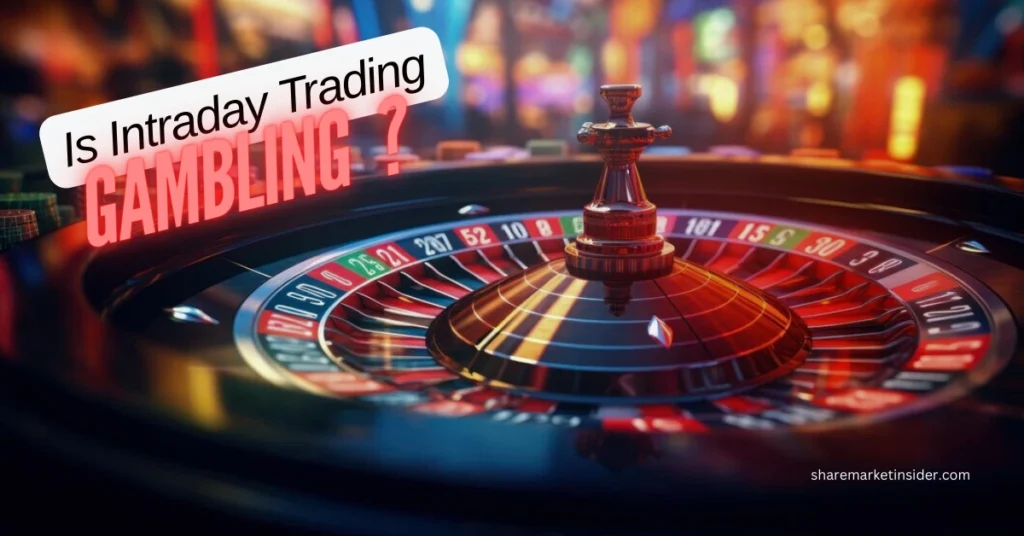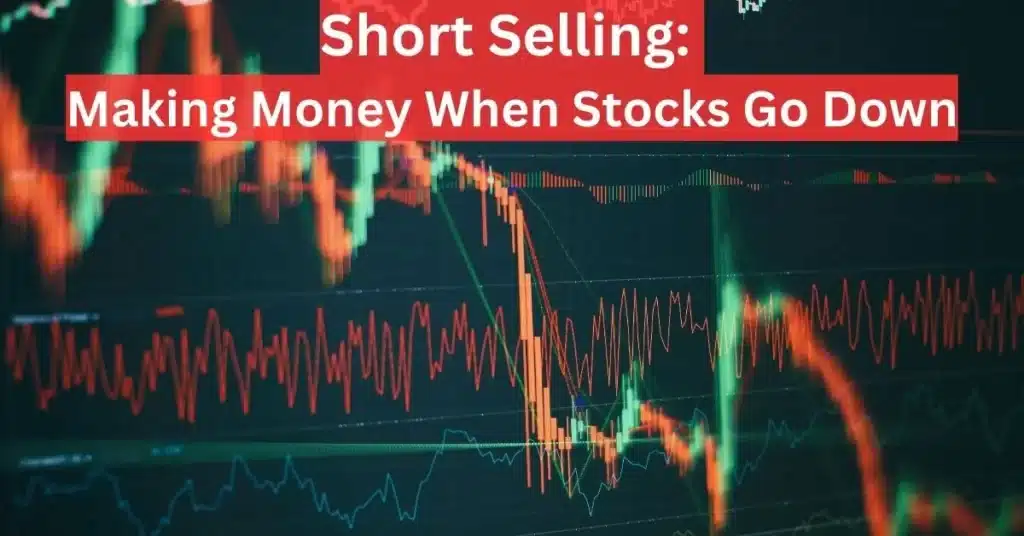Is intraday trading gambling? This question surfaces frequently, especially among those who are new to the stock market or cautious about the volatility of day trading.
Intraday trading is an activity of buying and selling any financial asset within a single trading day that is between 9:00 am to 3:30 pm IST, aiming to gain a profit on small price movement.
While it shares some surface-level similarities with gambling, there are crucial differences that set the two apart.
Understanding Intraday Trading and Gambling
Intraday Trading
Intraday trading, or day trading, is a form of active trading where an investor opens and closes positions within the same trading day.
Day traders aim to profit by capturing short-term price movements in stocks, commodities, or currencies. They rely on data analysis, market trends, and real-time information to make fast-paced decisions.
Gambling
Gambling, on the other hand, is the act of risking money or valuables on an event with an uncertain outcome, often relying on chance rather than strategy.
While skill games like poker involve some level of expertise, most forms of gambling are based on probability with a “house edge” that favors the establishment.
In short, gambling typically involves betting on outcomes that are largely or entirely out of the gambler’s control.
Key Differences Between Intraday Trading and Gambling
While both intraday trading and gambling involve financial risk and uncertain outcomes, they have distinct characteristics:
- Use of Skill and Strategy
- Intraday Trading: In Intraday trading, traders use a combination of analysis, technical indicators, market news, and their analytical understanding to make informed decisions. They apply strategies such as stop-loss orders and limit orders to manage risk, relying on skill to predict price movements.
- Gambling: Gambling outcomes often hinge on luck rather than skill. For example, in games like roulette or slot machines, the player has little to no control over the outcome.
- Control Over Risk
- Intraday Trading: Risk management tools allow traders to control losses. Traders can set stop-loss limits and manage position sizes based on their tolerance.
- Gambling: The odds are typically fixed by the game rules, and gamblers have minimal control over their risk level.
- Expected Value Over Time
- Intraday Trading: Through research and strategy, traders can aim for consistent returns over time, especially when they focus on high-probability setups.
- Gambling: Games like roulette or slots have negative expected value due to the house edge, making it difficult for gamblers to achieve consistent long-term profit.
Similarities Between Intraday Trading and Gambling
Despite the differences, there are certain parallels:
- High Risk
Both activities carry high risks, and participants can lose large sums of money if they lack experience or discipline. - Psychological Impact
Like gambling, intraday trading can trigger emotional responses. The thrill of quick gains or the stress of sudden losses can lead to impulsive decisions, blurring the lines between calculated trading and risky bets. - Chance and Uncertainty
Both involve uncertainty. Even with well-researched strategies, the market can be unpredictable, just as a casino game’s outcome is uncertain.
How to Approach Intraday Trading Responsibly
To prevent intraday trading from resembling gambling, traders should focus on the following practices:
- Developing a Strategy
Successful intraday traders rely on tested strategies, such as scalping, momentum trading, or range trading. Each strategy comes with its risk profile, time commitment, and technical indicators. - Utilizing Risk Management Techniques
Setting stop-loss limits, diversifying trades, and never risking more than a set percentage of capital on a single trade are essential practices. This disciplined approach minimizes the risk of significant losses and helps keep emotions in check. - Continuous Education and Market Awareness
Unlike gambling, intraday trading allows for continual learning and adaptation. Traders can study market trends, economic news, and trading psychology to improve over time. - Separating Emotion from Action
Emotional control is a cornerstone of responsible trading. Many successful traders use journaling and mindfulness techniques to avoid emotional trading, reducing the impulse to chase losses or “double down” on a losing trade.
Is Intraday Trading Suitable for Everyone?
Intraday trading requires a specific skill set, discipline, and the capacity to handle high-stress situations.
Those who treat intraday trading as an investment activity rather than a game often achieve better results.
Beginners should start by practicing with virtual accounts to gain experience without risking real money.
Unlike gambling, where the odds are often stacked against the player, informed and disciplined traders can potentially create an edge in the market.
However, the rapid nature of intraday trading and the potential for losses means it is not ideal for everyone, particularly those who lack the time or experience to commit to such an intensive activity.
FAQs: Intraday Trading vs. Gambling
- Can intraday trading become addictive like gambling?
Yes, the fast-paced nature of day trading can lead to addiction-like behaviors in some individuals. Traders who notice compulsive trading habits should seek guidance or consider stepping back. - Do professional traders make consistent profits from intraday trading?
While some professional traders generate consistent profits, it requires skill, experience, and strict discipline. Most beginner traders experience initial losses as they learn. - What’s the best way to start intraday trading responsibly?
Beginners should start with a demo account, develop a strategy, set clear risk limits, and focus on learning rather than making quick profits.
Conclusion
While intraday trading and gambling share the risk of financial loss and elements of uncertainty, the two are distinct.
Gambling largely relies on luck, with outcomes set by probabilities that favor the establishment, while intraday trading allows for skill, strategy, and a level of control over risk.
Intraday trading can be a calculated and strategic endeavor for traders who approach it with discipline, a solid strategy, and risk management.
Those who trade impulsively, without a plan, or in pursuit of thrills, however, are indeed approaching it much like gambling.
To make the most of intraday trading, focus on continuous learning, avoid emotional decision-making, and prioritize responsible risk management.



